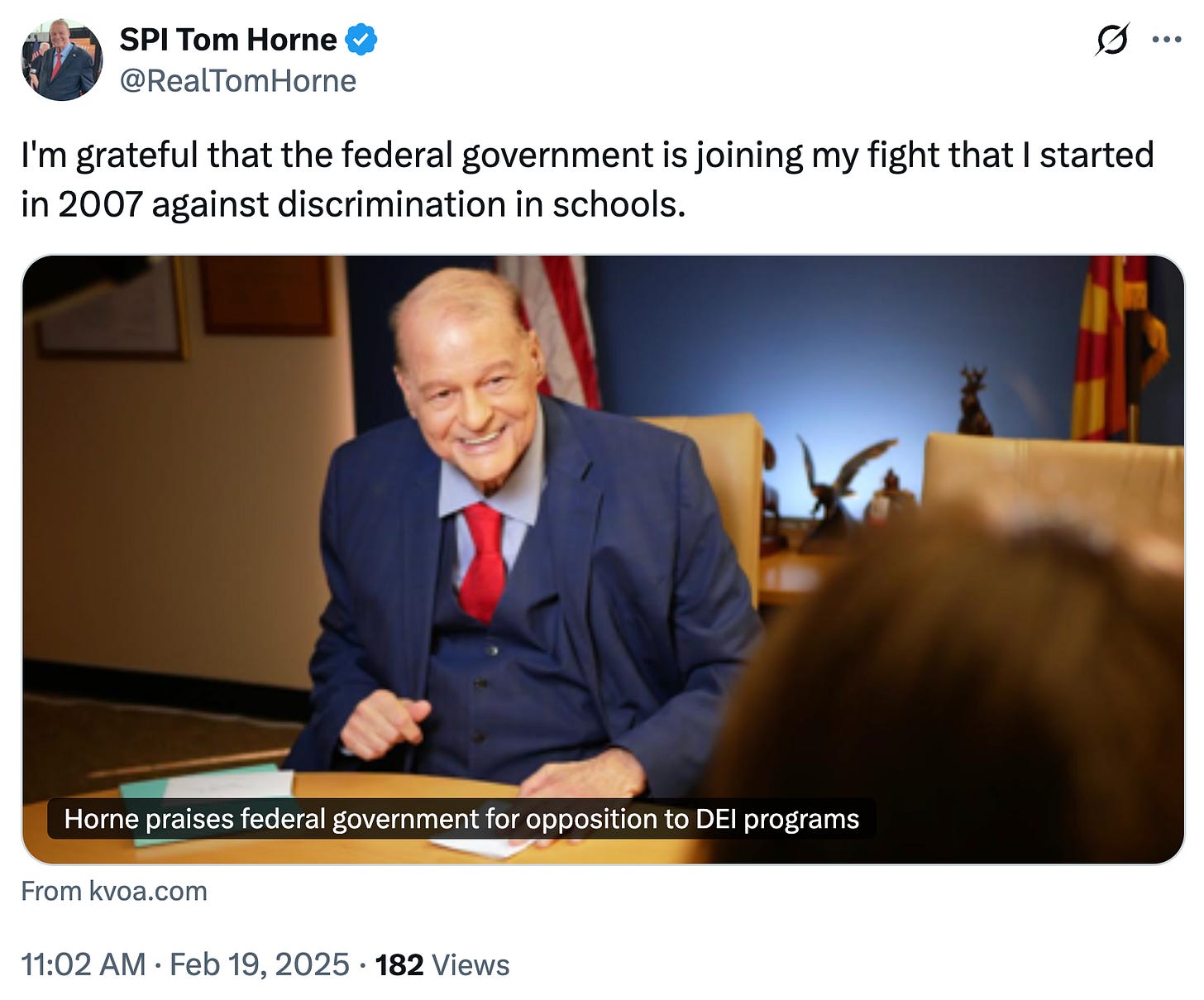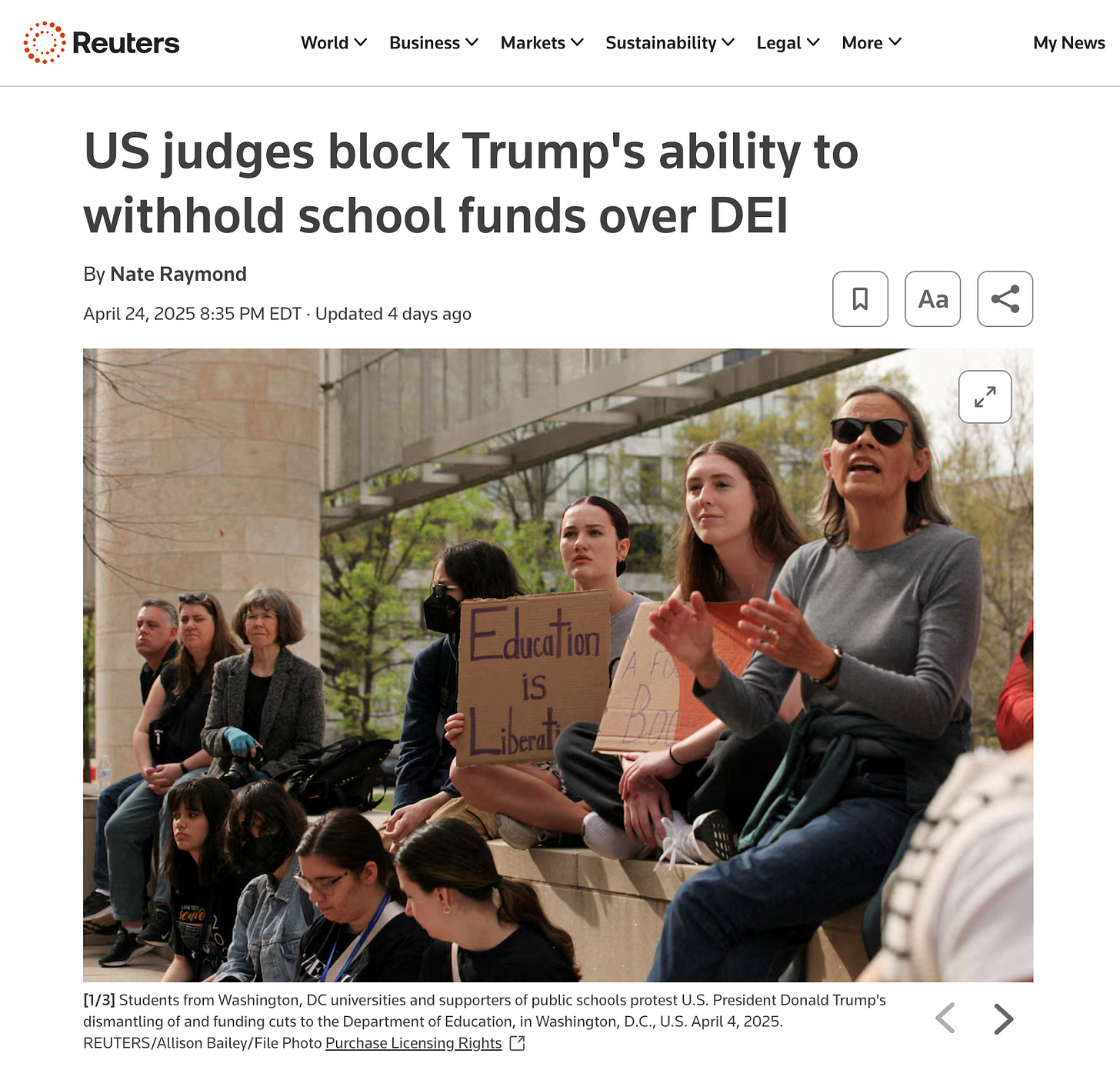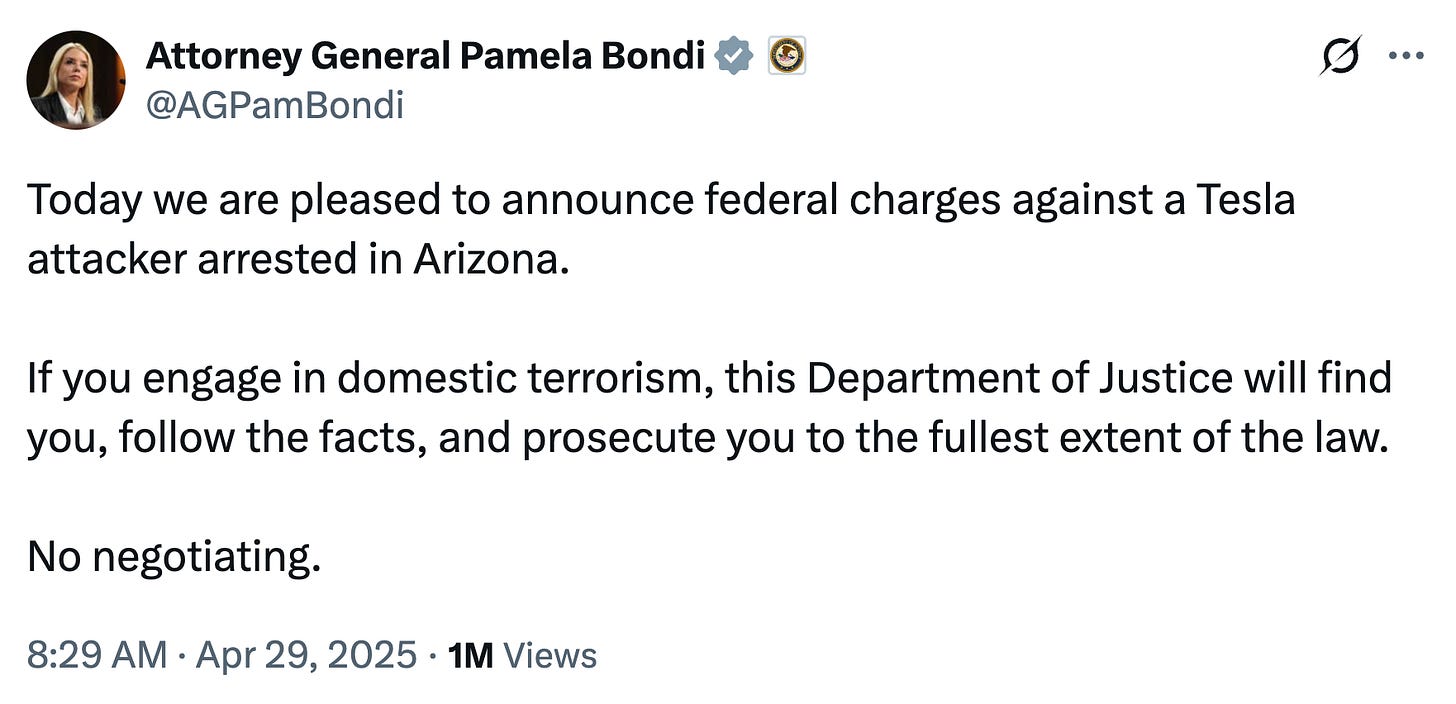
Too vague for their own good
“Strategic uncertainty” backfires … Prop 123 meets voucher protections … And we will, once again, have John to kick around.
Tom Horne isn’t giving up.
Last week, three federal judges smacked down an anti-DEI policy that the Trump administration was pushing and that Arizona’s superintendent of public instruction adamantly supported.
Undeterred, Horne posted a list of school districts that refused to comply with that policy on the Arizona Department of Education website this week.
“Those districts or charters who certified complains will be listed as IN COMPLIANCE WITH FEDERAL CIVIL RIGHTS LAW. Those that refused to certify or failed to respond will be listed as OUT OF COMPLIANCE WITH FEDERAL CIVIL RIGHTS LAW.”
Those all caps are all Horne’s. That’s how the notice appears on the education department’s website, complete with an apparent misspelling of the word “compliance” as “complains” that spellcheck didn’t catch.
It’s the latest move in what promises to be a long-running legal saga as the Trump administration tries to make good on his campaign promises to wage a culture war against DEI.

Horne compares his current fight against DEI to his fight against the Mexican American Studies program at TUSD. The courts eventually struck down the law banning that program, saying it was enacted with “racial animus.”Readers of the Education Agenda will be familiar with the backstory on all this by now, but Arizona Agenda readers might need a cheat sheet for what’s happening here.
In February, U.S. Department of Education officials sent a letter demanding every K-12 school district get rid of “illegal DEI” policies. They followed up in early April, saying every district had to certify they had complied.
But federal officials never really explained what was banned under the new policy.
Instead, they leaned on a 2023 U.S. Supreme Court ruling that blocked race-conscious admissions at universities and they claimed DEI in K-12 schools was discrimination “against students on the basis of race, including white and Asian students.”
Schools had until last Thursday to send in their letters of compliance, or the Trump administration would withhold billions of dollars in federal funding, including $770 million for Arizona’s public schools.
That led most of Arizona’s public school districts and charters — 551 out of 658 — to send their letters by the Thursday deadline. Those are the schools Horne posted on the ADE website this week.
Meanwhile, the courts have been ripping Trump’s anti-DEI policy to shreds.
Taking it to court
The ambiguity of the new policy worked like a charm when federal officials were bullying school districts.
But it didn’t fare so well when three federal judges, including two that Trump himself appointed in his first term, dug into their arguments, or lack thereof.
A judge in New Hampshire said the policy contained “vague and confusing prohibitions,” New Hampshire Public Radio reported.
Federal officials were trying to push an “ocean-wide definition of DEI,” Judge Landya McCafferty, an Obama appointee, wrote in her ruling.
“A professor runs afoul of the 2025 Letter if she expresses the view in her teaching that structural racism exists in America, but does not do so if she denies structural racism’s existence. That is textbook viewpoint discrimination,” McCafferty wrote.
In Maryland, Judge Stephanie A. Gallagher, who was appointed by Trump in his first term, also blocked the anti-DEI policy.
The court is “constitutionally required to closely scrutinize whether the government went about creating and implementing [policies] in the manner the law requires. The government did not,” Gallagher wrote.
Gallagher added a touch of skepticism for federal lawyers who insisted all the new policy did was guard against racial discrimination.
"This Court must concern itself with what the Letter actually says, not what the government says the Letter says,” Gallagher wrote.
Gallagher blocked the Trump administration temporarily from cutting funds from schools based on the anti-DEI policy, while McCafferty did the same for any school that employs a teacher from one of the groups that sued in New Hampshire.
In Washington, D.C., federal Judge Dabney Friedrich, who also was appointed by Trump, temporarily blocked federal officials from enforcing the new policy, saying it was flawed by “unconstitutional vagueness.”
“Although the challenged documents place a particular emphasis on ‘certain DEI practices,’ they fail to provide an actionable definition of what constitutes ‘DEI’ or a ‘DEI’ practice, or delineate between a lawful DEI practice and an unlawful one,” Friedrich wrote.
It’s not over yet
Like we said earlier, this is a saga that’s going to go on for a while.
Last Friday, the day after the deadline and the judges’ rulings, 19 states sued the U.S. Education Department (Arizona isn’t one of them).
They want a judge in Massachusetts to declare the new policy null and void, saying the policy is “new, vague, confusing, and incorrect,” Chalkbeat reported.
At the local level, at least two school districts in Arizona are pushing back on the anti-DEI policy.
Before the judges ruled, the Tucson Unified School District Governing Board voted to sign a letter certifying they were dropping any DEI policies. But in the wake of the rulings, the district said they wouldn’t send in the letter after all. (But, oddly, they still appear on Horne’s IN COMPLIANCE list.)
The governing board at the Tolleson Union High School District went even further.
“We will not allow veiled legal threats or political pressure to undermine our district’s longstanding commitment to serving all students,” the Tolleson district said in a press release, calling the new policy “a political tool masquerading as policy.”
Meanwhile, Horne shows no sign of slowing down. Last week, he went to Marana to encourage people to call in complaints if they see DEI policies at their local schools, Arizona Luminaria’s Shannon Conner reports.
And after the judges ruled on Thursday, Horne said “it’s my educated opinion as a former attorney general that the decisions by these district courts will be overturned by the United States Supreme Court,” KJZZ’s Ignacio Ventura reported.
So there’s still a long way to go before the issue is settled.
Republican lawmakers have a plan to protect Arizona’s universal school voucher program by locking it into the state Constitution.
And if you’re thinking “well, voters will never go for that,” you might want to check out the plan.
Read all about it in this week’s edition of the Education Agenda!
More DEI strings: If states like Arizona want federal money for election security, they might have to renounce DEI policies, the Washington Post’s Yvonne Wingett Sanchez and Patrick Marley report. Arizona Secretary of State Adrian Fontes said he is weighing his options about how to respond to the Trump administration’s newest directive. Federal officials didn’t define exactly what they mean by “DEI,” Fontes said, which he said could open him up to liability “in the ultimate game of gotcha.”
Why not sue?: While Fontes debates how to handle the new DEI restrictions, Arizona Attorney General Kris Mayes announced she is suing the Trump administration over a halt in grant funding and mass firings at AmeriCorps, the Republic’s Stacey Barchenger reports. Mayes says she isn’t even close to done filing lawsuits against the Trump administration, KTAR’s Kevin Stone reports.
“I’ll stop suing Donald Trump when he stops violating the Constitution and engaging in unlawful activity,” Mayes told KTAR News 92.3 FM’s The Mike Broomhead Show on Tuesday.
Not a terrorist: The man accused of trying to burn down a Tesla dealership in Mesa was arrested and charged in federal court, Axios’ Jessica Boehm reports. Since Tesla owner Elon Musk is buddies with President Donald Trump, Attorney General Pam Bondi took the time to post about the arrest on X, which also is owned by Musk. While Bondi called the crime “domestic terrorism,” the man was only charged with malicious damage to a vehicle by means of fire.
Super-duper secret: Arizona Sen. Jake Hoffman is trying to drum up interest for an “all-star” candidate who will run against Superintendent of Public Instruction Tom Horne in the GOP primary. Hoffman has been on Horne’s case for weeks, calling him a threat to the state’s education system. Hoffman didn’t say who his secret candidate was, just that he’d never run for the superintendent position before.
Surreal experience: After several weeks of international students suddenly finding out their visas had been revoked, federal officials are changing course and reinstating most of those visas. The Arizona Luminaria’s John Washington spoke with a University of Arizona student who was relieved to hear the news, but is still stressed out over the whole ordeal.
“The first two days I was lost completely. I couldn’t think at all,” the student said. “The situation was so surreal, unexpected. I was concerned about my paper, my resume, my studies, my source of happiness.”
Tough choices: GOP lawmakers are pushing the “ag-to-urban” plan to convert farmland into residential properties as a way to save water. KJZZ’s Camryn Sanchez spoke with farmers in the West Valley who are eyeing the financial opportunity, while dealing with giving up land that has been in their families for generations.
Life is full of tough choices. Here’s an easy one: Click that button and get the best political newsletter in Arizona.
Getting off the starting line: A new federal budget plan wouldn’t fund Head Start, and that could be a big blow to families on the Tohono O’odham reservation and other Indigenous communities, Arizona Public Media’s Paola Rodriguez reports. Budget documents say eliminating the program, which serves thousands of Arizona families with services for kids like early learning and health, is consistent with the Trump administration’s goal of returning education to the states and beefing up parental control.
Coming out of the woodwork: The Phoenix Suns are in hot water again with another former employee who says the team discriminated against her because she’s a Hispanic woman, Phoenix New Times’ Zach Buchanan reports. Two other employees have sued and the team is still feeling the aftereffects of a 2022 ESPN investigation that showed a toxic workplace culture.
While the U.S.-China trade war steals all the headlines, another rivalry is simmering between the two countries.
Whichever country takes the lead in manufacturing for artificial intelligence will set the course for the industry over the next few decades.
And Arizona is right in the thick of it.
Subscribe to the A.I. Agenda today so you’ll get the news directly in your inbox tomorrow morning!
Every veteran of Arizona’s political scene has a wild John Fillmore story.
Fillmore was a state lawmaker (at two different times) who said some of the weirdest stuff you ever heard. He always answered the phone, and he was a goldmine for reporters.
A quick sample is in order.
On Arizona’s election laws: “We need to get back to 1958-style voting.”
On his art: “I buy metal flowers and make metal figures, and I shoot fire and water out of them… Listen, I make no qualms about my work. It is low-grade. I mean, people have bought stuff from me, and I’m thinking, ‘I wouldn’t buy that.’”
On life as a professional artist: “I have the perfect job outside of working in a — for a guy, and I don’t mean this like it sounds — in a topless bar. I play with nuts, bolts, screws and fire, and I BS all day.”
On trans people: "What's going to happen when, someday, someone wakes up and they want to go to a far extreme and identify as a chicken or something, for crying out loud? Where do we draw the line?"
Last we heard, Fillmore was holed up in the mountains of Oregon “recuperating” from his 2022 election loss by “drinking incessantly” and camping in a motel.
That is, until yesterday, when he filed a statement of interest to run against Democratic U.S. Rep. Greg Stanton.
Welcome back to the arena, John! We have a feeling he’ll be a regular feature in this section of the newsletter.
















On paper Fillmore is as bizarrely nutty as a Gosar, Biggs, or Lake. Is it is his openness or quirky artwork and self deprecation that somehow sets Fillmore apart?
It’s a fine line between amusing and terrifying, but damn, you walk it hard, Hank.